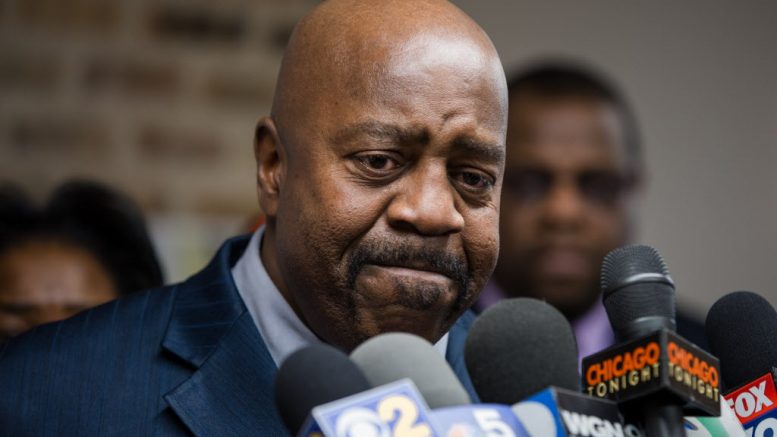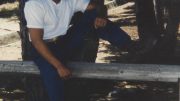Two years ago, a federal jury handed a mere $80,000 to a wrongfully convicted ex-El Rukn gang member who spent more than a decade on Death Row only to be cleared of a double murder.
Nathson Fields called it a “travesty” at the time and he called for a federal investigation.
But little did he know, his decades-long legal saga wasn’t over. A judge would order a do-over within a year because another former gang member had gone free under suspicious circumstances. So the case went to trial again last month. And Thursday, a jury came back with a new verdict in Fields’ case against the city and Chicago detectives David O’Callaghan and Joseph Murphy.
This time, it handed Fields $22 million.
“Through his own hard work and good fortune and good luck along the way, (Fields) was able to exonerate himself,” Jon Loevy, Fields’ attorney, said at a news conference held later. “He was able to win his retrial and prove his innocence. And the last chapter was this case in federal court, where Nate spent the last month putting on evidence that he was framed.”
In the midst of the trial, federal prosecutors persuaded a judge to reduce the sentence of a notorious El Rukn killer who gave incriminating testimony against Fields. Fields’ lawyers have argued that killer could now go free as soon as next year.
Fields broke out in tears in the courtroom of U.S. District Judge Matthew Kennelly when the verdict was read. He continued to wipe his eyes as he stepped out of the courtroom to celebrate with his attorneys.
At a news conference later, Fields, who was slated to be executed twice while in prison, said he hopes his exoneration could give hope to others who have been wrongly convicted.
“I stand before you as the living proof that there’s other men in prison for things they didn’t do,” Fields said. “I hope my case will be the catalyst to bring all this the light and to bring many innocent men and women home to their family.”
O’Callaghan’s attorney, Shelly Kulwin, told a reporter he had recently lost faith in the electoral process and added: “Today, I lost all my faith in the judicial system.”
Later, Chicago law department spokesman Bill McCaffrey suggested Fields’ legal fight isn’t over.
“We are disappointed by and will be appealing the jury’s verdict,” McCaffrey said in a statement.
The jury handed Fields $22 million to be paid by the city, $30,000 from O’Callaghan and $10,000 from Murphy. It found that O’Callaghan and Murphy violated Fields’ due process rights, and that the violation was a result of a Chicago policy or widespread practice. It also made an intentional infliction of emotional distress finding against O’Callaghan.
Fields spent 18 years behind bars, including 11 on Death Row, before he was cleared at a 2009 retrial for the 1984 murders of Talman Hickman and Jerome “Fuddy” Smith. It was revealed in the meantime that Cook County Judge Thomas Maloney, who presided over Fields’ original 1986 trial, took a $10,000 bribe that he returned only because he thought the feds were watching.
After Fields was cleared, a long-missing police file connected to his case was “discovered,” buried in an old filing cabinet in the basement of a South Side police station. For years, police and prosecutors denied it existed. But Fields’ lawyers believe it was hidden on purpose because it held evidence that might have cleared their client far sooner.
Fields filed his lawsuit in 2010. Though he first took it to trial in 2014 and landed an $80,000 verdict, the release later that year of El Rukn killer Earl Hawkins months after he testified against Fields raised eyebrows. The U.S. Parole Commission received letters supportive of Hawkins’ parole from O’Callaghan and Chicago Police Det. Daniel Brannigan, as well as Cook County Assistant State’s Attorney Brian Sexton, records show.
Kennelly ruled in April 2015 that it appeared Hawkins got a “bonanza” deal, ordering a new trial that began Nov. 14.
Three days into the latest trial, federal prosecutors asked U.S. District Judge Rebecca Pallmeyer to cut the sentence of El Rukn enforcer Derrick Kees from 25 years to 12 years, saying Kees had provided “substantial assistance to the government” by testifying against Fields. Kees told jurors last month that he had a conversation with Fields, Hawkins and others soon after the 1984 murders. Kees said Hawkins gave a “play-by-play” of the killings, and Fields said “it was a good exercise.”
Kees once faced 99 years in prison for racketeering on top of a state murder sentence of 55 years. He is now on track to be released in November 2021, though Fields’ lawyers say he could go free as early as next year.
On the stand, Kees denied being a “hit man,” “serial killer” or “sociopath.” But he told the jury, “I killed people,” and he declined to say how many.
At the news conference after the jury’s decision, Loevy called the decision to offer reduced sentences to two convicts in exchange for their testimony against Fields “outrageous.”
“They took guys that were recidivist murderers — assassins, really — and they gave them big sentence breaks to testify in this civil case consistent with the police version, and I guess the jury wasn’t buying it,” he said.
Source: chicago.suntimes.com




